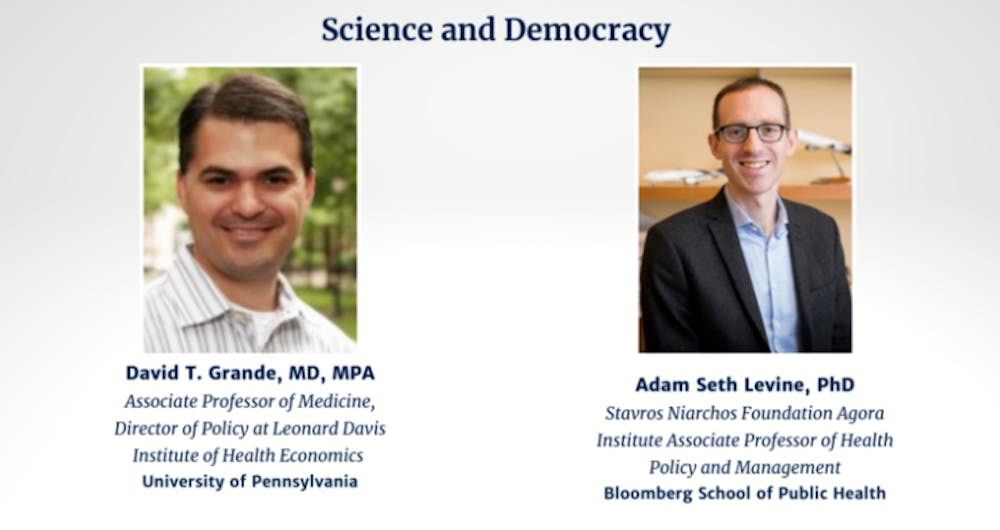It is no secret that the presidential election of 2020 is one of the tensest, most polarized elections in recent years and certainly one for the history books. With two drastically different candidates in such a high-stakes election, the results will have lasting implications and deep consequences on issues regarding public policy, climate change, the economy, COVID-19 and the zeitgeist of the early 21st century.
The Hopkins Science Policy Group (JHSPG), whose mission is to promote evidence-based science and public health policies, has been hosting a series of seminars in a campaign called STEMulate the Vote in hopes of igniting greater political engagement.
On Oct. 30, one such talk titled “Science and Democracy” was hosted by JHSPG with speakers Dr. David Grande of the University of Pennsylvania and Adam Seth Levine of the Stavros Niarchos Foundation Agora Institute.
Grande began his talk by sharing research from a recent study comparing voting rates of physicians, a relatively privileged and highly educated group, with other Americans of similar means in the last decade from New York, California and Texas: 51% of non-physicians voted compared to 37% of physicians.
Grande attributed this unexpected disparity to a general sense of apathy in the medical profession.
“A lot of physicians I talk to have been allergic to politics. It’s something they view with a sense of distaste, and they look down on it, frankly,” he said.
This is a startling conclusion, he explained, particularly because doctors interact with so many people who will be directly impacted by health care policies. They have the position and power to encourage others to vote, especially those who need to represent their own medical interests.
“People in worse health have lower voting rates,” Grande said. “Some of the people who suffer the greatest might have the most diminished voices.”
Levine discussed issues of credibility from the scientific community as well as why public engagement is important.
“Why should scientists be engaged in public affairs?” he posed. “At the basic level, self-governance requires it of you, but reflect upon the kind of knowledge that you might take for granted every single day in your working and school lives. It’s not knowledge that everybody has but people could benefit from.”
Levine went on to describe how more public engagement from scientists could be useful in the present pandemic.
“Plenty of people are more than happy to talk about what they think about masks, social distancing, public health, regardless of whether they have the kind of experience and expertise that many of you have,” he said. “If you don’t engage, other people are going to.”
In this particularly divisive era of time, American distrust of science and experts is at a high. Levine explained how to bridge this gap on issues of credibility.
“Think about whether your audience is likely to perceive you as credible. What are the values of your audience?” he said. “Be very explicit about your own values because in a lot of cases, they’re probably the same as your audience. The problem arises when they think that experts are valueless people because they don’t like valueless people.”
In an interview with The News-Letter, Rohit Sivananthan, a sophomore Molecular and Cellular Biology major who attended the event, said that he was often surprised by the lack of political involvement he saw in physicians and lawyers.
“I’d expect for [physicians and lawyers] to have strong opinions, but they don’t, and the only reason I can see for those groups not voting is apathy,” he said.
Sivananthan described the message of responsibility imparted by the speakers.
“A good takeaway is that privileged people still have the responsibility of making sure that other people can carry out their duties and use their rights as effectively as possible,” he said.
Grande similarly left off his talk on an optimistic note.
“To give you hope, everybody is waking up, and I hope all of you are waking up as well to the need to engage,” he said.





